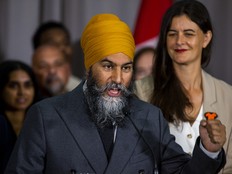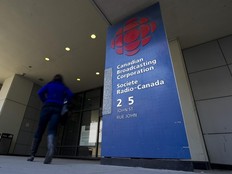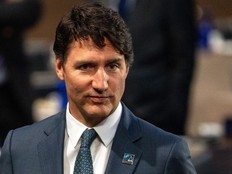Franco Terrazzano
LATEST STORIES BY FRANCO TERRAZZANO
OPINION: Singh should return NDP to its roots and scrap the carbon tax
NDP Leader Jagmeet Singh has a golden opportunity to bring his party back to its roots by fighting to scrap the carbon tax. “We want to see an approach to fighting the climate crisis where it doesn’t put the burden on the backs of working people,” Singh said, when asked about his stance on the carbon tax. This is a huge opening on the carbon tax and the NDP should drive a truck through it. Jack Layton, the leader who brought the NDP to its high-water mark, opposed the carbon tax. “Those advocating a carbon tax suggest that by making the cost of certain things more expensive people will make different choices, but Canada is a cold place and heating your home really isn’t a choice,” Layton said. “We shouldn’t punish people and that’s what a carbon tax does.” Back then, it was normal to see the NDP leader doing news conferences flanked by people wearing yellow vests and hard hats. Layton often highlighted working people who knew how to use a welding torch and had a Class One licence in their pocket. The party’s provincial politicians opposed carbon taxes, too. When the B.C. Liberals created the first carbon tax in Canada, the NDP railed against it. Its leader at the time, Carol James, called claims of a revenue-neutral carbon tax “lipstick on a pig.” The B.C. NDP’s 2008 campaign slogan was “Axe the Tax.” Like anyone else, politicians can wander off track. They can go along to get in with the “in crowd,” until they realize the in crowd is full of folks who don’t understand where home heating comes from. It’s important to leave the door open and let politicians return to their core. This potential carbon tax awakening from Singh is one of those opportunities. All Singh needs to do is walk back through the door to the house his party built and return to the original stance of the NDP — opposing the carbon tax. And there are election results to back that stance up. Former Liberal leader Stéphane Dion built his 2008 election campaign platform around carbon taxes. The Liberals lost 26 seats. The NDP, with Layton hammering away at the carbon tax, gained eight seats. Layton’s NDP maintained that opposition and it paid off. In 2011, the NDP captured 103 seats during Layton’s Orange Wave and formed official opposition for the first time in its history. “The well-documented reality is, the NDP has opposed a carbon tax in the past and continues to do so now,” the NDP said in 2012. The most popular premier in the country, according to Angus Reid’s March poll, is the NDP’s Wab Kinew. Under Kinew, Manitoba suspended its 14¢ per litre fuel tax. “In our household, the workhorse that we use to drive to work, to drive the kids to their activities, is a pickup truck and it takes 100 litres to fill up every time we go to the pump,” Kinew said. “For a family using a vehicle like that, it’ll save you $14 every single time you gas up.” Singh’s right that carbon taxes put “the burden on the backs of working people.” The carbon tax on natural gas costs the average family more than $300 to heat their homes annually. A mom filling up her minivan once a week will pay $670 more per year because of the carbon tax. The carbon tax will cost Canadian truckers about $2 billion this year and it will cost Canadian farmers $1 billion by 2030. And for average Canadians, the rebates simply don’t cover the economic costs that cascade through the economy, according to the parliamentary budget officer. With Layton at the helm, the NDP knew way back in 2008 that the carbon tax was a punishment on ordinary people, from farmers to truckers to workers shopping for groceries while struggling to afford their heating bills. Singh should take a page from Layton’s playbook, seize the moment, and fight for working-class Canadians by pushing to scrap the carbon tax. Franco Terrazzano is the federal director and Kris Sims is the Alberta director of the Canadian Taxpayers Federation

OPINION: Carbon tax on trucking is a tax on everything
Stop what you’re doing and look around.

TERRAZZANO: Time to end bonuses and defund the CBC
The CBC is making the best case for why it should be defunded. The CBC rubber-stamped a fresh batch of bonuses for 1,194 executives, managers and non-union staff. According to the Canadian Press, this year’s bonuses will cost taxpayers more than $18 million. That includes $10.4 million in bonuses for 631 managers, $4.6 million for 518 other employees and $3.3 million for 45 executives. The average bonus for those 45 CBC executives is $73,000, which is more than the annual salary of the average Canadian worker. CBC dished out these bonuses despite elected MPs on the parliamentary heritage committee issuing a report stating: “Given the job cuts announced at CBC for 2024, it would be inappropriate for the CBC to grant bonuses to executive members.” It’s not like CBC executives are struggling. CBC President Catherine Tait’s annual pay is between $472,900 and $623,900, which includes her salary, bonus and other benefits. The CBC won’t disclose how big Tait’s bonus is this year. But in 2014, Tait’s predecessor, Hubert Lacroix, told a Senate committee his annual bonus was “around 20%.” Tait’s “maximum bonus is $145,880 if she is at the top end of her salary range,” according to Global News. This year’s bonuses come on the heels of the CBC crying poor and begging the feds for more taxpayer cash. RECOMMENDED VIDEO Tait told a parliamentary committee the CBC is plagued by “chronic underfunding,” despite taking $1.4 billion from taxpayers this year. What’s worse? The fact Tait thinks the CBC is chronically underfunded, but refuses to end bonuses for CBC executives. Or the fact she thinks the CBC is chronically underfunded even though it takes more than $1 billion from taxpayers every single year. This year’s bonuses are just the tip of the iceberg. In 2015, the CBC rubber-stamped $8 million in bonuses. This year, the CBC is handing out $18 million in bonuses. That means the cost of the CBC’s taxpayer-funded bonuses has more than doubled in a decade. In fact, the CBC has been rubber-stamping bonuses every single year. Since 2015, CBC’s bonuses cost taxpayers $132 million. Then there’s the CBC’s inflated salaries. In 2015, 438 CBC staffers were taking home a six-figure base salary, according to access-to-information records obtained by the Canadian Taxpayers Federation. There are now 1,450 CBC employees taking a six-figure salary. That means the number of CBC employees taking home a six-figure salary has increased by 231% under Prime Minister Justin Trudeau. The CBC is about to waste even more tax dollars. The CBC acknowledged “the views expressed by some that (bonuses) should not be awarded.” So, its bright idea is to hire a “third-party human resources consulting firm” to conduct a “comprehensive review” of its bonuses. Translation: The CBC is going to spend more tax dollars on consultants to tell them whether they should keep rubber-stamping bonuses for themselves at taxpayers’ expense. The CBC shouldn’t waste more tax dollars hiring consultants to review its bonuses. The CBC should end its bonuses. Unfortunately, Tait and the CBC brass seem completely unwilling to do the right thing. So, Trudeau, Finance Minister Chrystia Freeland and Heritage Minister Pascale St-Onge must step in and force Tait and the other CBC fat-cats to end these taxpayer-funded bonuses. Or better yet, they should defund the CBC once and for all and save taxpayers more than $1 billion every year. Franco Terrazzano is federal director of the Canadian Taxpayers Federation

TERRAZZANO: Canadians looking for cuts to Ottawa’s bureaucracy
Taxpayers know we’re paying for too many paper pushers in the federal government. A Leger poll commissioned by the Canadian Taxpayers Federation shows a plurality of Canadians want to shrink Ottawa’s bureaucracy. The poll shows 47% of Canadians want to reduce the number of federal bureaucrats. Less than three-in-10 Canadians want to maintain the current number of federal employees. Only 7% of Canadians think the federal government should hire more bureaucrats. The rest were unsure. Canadians are right — the federal government is bloated under Prime Minister Justin Trudeau. Since Trudeau took office in 2015, his government added 108,793 bureaucrats, bringing the total up to 367,772 federal employees. That’s a 42% increase in less than a decade. Canada’s population only grew by 14% during that time. There would be 72,491 fewer federal paper pushers had Trudeau kept growth in the bureaucracy in line with population growth. The average annual compensation for full-time federal bureaucrats is $125,300, when pay, pension and other perks are accounted for, according to the Parliamentary Budget Officer (PBO). That means 72,000 excess bureaucrats cost taxpayers roughly $9 billion per year. That’s the same amount of money as cutting the first two income tax rates by a percentage point. The Leger poll also broke down results based on Canadians’ voting intentions. Seventy-one per cent of Conservative voters want to shrink the federal bureaucracy. This has big implications. Polls show the Conservatives are poised to form the next government. Their supporters expect them to shrink Ottawa’s bureaucracy. RECOMMENDED VIDEO “The government does not have a revenue problem, they have a spending problem,” Conservative party Leader Pierre Poilievre said, “They have nearly doubled government spending in a decade (and they’ve) added about 50% more bureaucrats.” Poilievre promises to “fix the budget and bring Canadians the relief they desperately need.” His ability to deliver on that promise will be directly tied to his ability to shrink the bureaucracy. That’s because the bureaucracy consumes more than half of the federal government’s day-to-day spending. There is no fixing the budget without cutting the cost of the bureaucracy. Along with reducing the number of federal paper pushers, Poilievre should also rein in pay and perks. Trudeau handed out more than one million pay raises in the last four years alone. If Poilievre is going to end bureaucrat pay raises, he should first commit to ending the pay raises MPs give themselves every year. Before going on strike last year, federal government unions pointed to the yearly salary increases of senators and members of Parliament” as a reason bureaucrats should be given more taxpayer cash. Showing leadership and a willingness to rein in MP pay will go a long way in helping politicians rein in the bureaucracy. In fact, the Stephen Harper government showed it would “lead by example” as it froze MPs’ pay between 2010 and 2013. The government must also stop rewarding failure with taxpayer-funded bonuses. The feds rubber-stamped more than $1.5 billion in bonuses since 2015. Ottawa’s bonuses keep flowing despite the PBO finding that “less than 50% of (performance) targets are consistently met.” Poilievre knows this is a problem. He said he would “cancel bonuses for failing government authorities and that would include, for example, the Bank of Canada and the CBC.” Here’s the bottom line: Taxpayers pay for too many federal paper pushers. Any politician who wants to fix the budget and cut taxes must shrink the federal bureaucracy. Franco Terrazzano is federal Director of the Canadian Taxpayers Federation

TERRAZZANO: Trudeau must prove he won’t tax our homes
Actions speak louder the words. That’s especially true when those words come from a politician with a track record of breaking promises and hiking taxes. Prime Minister Justin Trudeau says he won’t send the taxman after Canadians’ homes. But if Trudeau wants Canadians to believe he won’t impose a home equity tax, there’s one thing he must do: End the Canada Revenue Agency’s home reporting requirement. In 2016, the Trudeau government made it mandatory for Canadians to report the sale of their primary residence even though it’s tax-exempt. If you sell your home, the CRA wants to know how much money you received from that sale. But if the taxman isn’t taxing it, why is the taxman asking that question? Is the CRA just curious? Opposition Leader Pierre Poilievre confirmed to the Canadian Taxpayers Federation that he would remove this reporting requirement if he forms government. Trudeau must do the same. Otherwise, Canadians should worry a home equity tax is right around the corner. As Toronto Sun columnist Brian Lilley recently wrote: “For Justin Trudeau and his Liberal party, taxing your primary residence is a bad idea they just can’t quit.” On June 25, Trudeau attended “a private town hall about generational fairness,” hosted by Generation Squeeze, a group advocating for home taxes. What do you notice about the theme of that town hall? The government recently used the cloak of generational fairness to impose its capital gains tax hike. The Trudeau government also spent hundreds of thousands funding and promoting a report from Generation Squeeze that complained of the “housing wealth windfalls gained by many homeowners while they sleep and watch TV.” RECOMMENDED VIDEO The report recommended charging a tax on the value of homes above $1 million. The tax would cost Canadians up to $5.8 billion every year and would hit many normal Canadians. In British Columbia and Toronto, the typical home price is above $1 million. Trying to improve affordability with tax hikes is like trying to boil water in your freezer. Higher taxes won’t make homes affordable. Consider this insight 50 pages into the report: “Owners of homes valued over $1 million that includes informal rental suites may try to recover the surtax by passing some of its cost on to renters.” It turns out higher taxes can make things cost more. The head of Generation Squeeze was invited to a cabinet ministers’ retreat in Charlottetown last summer. Documents uncovered by the CTF show staff in the prime minister’s office met twice with the head of Generation Squeeze, which included “a briefing about the tax policy recommendation.” Trudeau has an appetite for taxing people’s homes. His recent capital gains tax hike will impact Canadians who sell secondary residences and cottages. He imposed a so-called anti-flipping home tax. Trudeau also taxes homes that the government deems “underused.” With Trudeau scrounging through the couch cushions looking for more money to paper over his deficits, Canadians should worry a home equity tax is next. A home equity tax would come with a big bill for a young couple looking to upgrade to a family home or for grandparents who rely on the equity in their home to fund their golden years. As an example, Canadians who bought their Toronto home for $250,000 in 1980 and sold it for $1.2 million today would pay between $50,000 and $190,000, depending on the type of home equity tax. The Trudeau government has repeatedly flirted with home equity taxes. The only way for Trudeau to put Canadians’ minds at ease is to act and remove the requirement for taxpayers to report the sale of their homes to the CRA. Franco Terrazzano is federal director of the Canadian Taxpayers Federation





